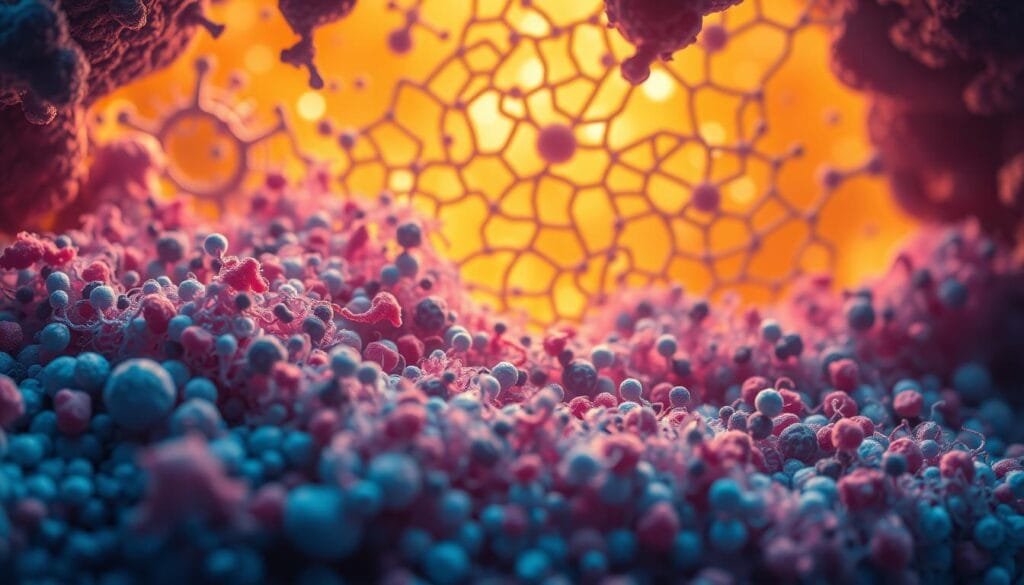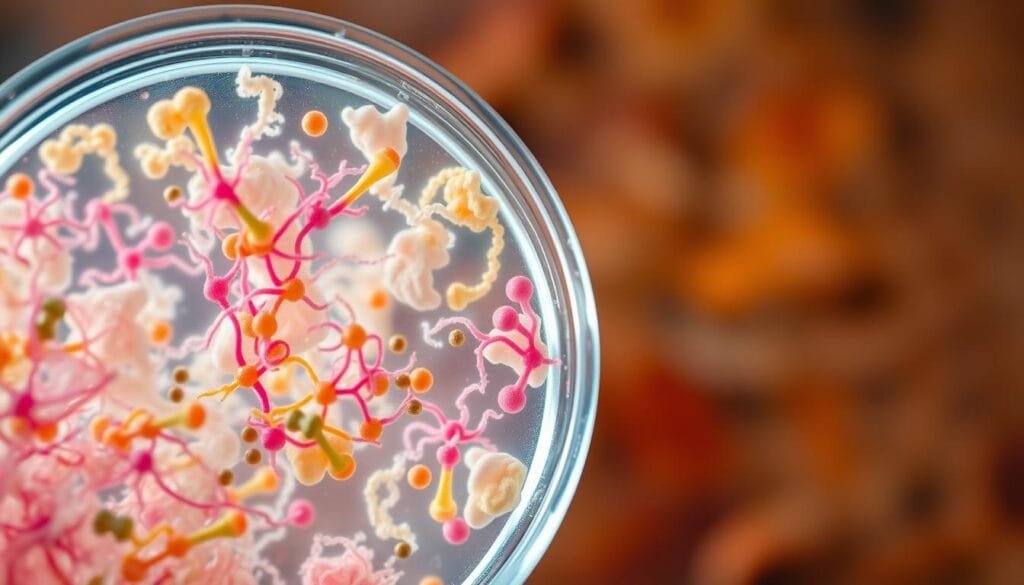Currently Empty: RM0.00
As populations worldwide grow older, scientists are uncovering new ways to support healthy aging. One promising area of research focuses on the gut microbiome—the trillions of bacteria living in our digestive systems. Studies now suggest these microscopic allies may play a surprising role in how well we age.
Recent discoveries reveal that maintaining gut balance becomes crucial as years pass. Cellular aging processes, once thought inevitable, show responsiveness to microbial activity. Specific strains of beneficial bacteria appear to influence markers linked to vitality and lifespan.
This guide breaks down groundbreaking findings about how microscopic organisms interact with our bodies. It explores their potential to address factors like inflammation and oxidative stress—key contributors to age-related decline. Readers will learn practical ways to harness these insights for everyday wellness.
From lab experiments to human trials, evidence highlights certain bacterial varieties with remarkable properties. These organisms don’t just aid digestion—they may help cells function optimally over time. The article also clarifies how to select supplements and fermented foods for maximum impact.
Key Takeaways
- Gut microbiome balance strongly correlates with healthy aging patterns
- Cellular aging mechanisms show responsiveness to microbial influences
- Specific bacterial strains demonstrate lifespan-extending properties
- Microbial supplements may reduce inflammation and oxidative damage
- Dietary choices significantly impact probiotic effectiveness over time
Introduction to Healthy Aging and the Role of Probiotics
The secret to vibrant aging might lie in an unexpected place: your digestive system’s microbial community. Scientists now recognize that maintaining gut balance becomes essential for preserving vitality as years advance. This shift in understanding transforms how we approach growing older—focusing not just on lifespan but on healthspan.
Modern lifestyles often disrupt microbial harmony. Processed meals, chronic stress, and medications can deplete beneficial bacteria—a concern that grows with age. Research shows these microscopic allies help maintain immune resilience and cognitive sharpness, directly impacting quality of life.
Key studies highlight specific strains that support:
- Enhanced nutrient absorption
- Reduced inflammation markers
- Improved metabolic functions
This evidence aligns with the World Health Organization’s definition of healthy aging as maintaining functional ability. Microbial supplements work synergistically with balanced diets and physical activity, offering a science-backed strategy for those seeking to age gracefully.
Understanding Probiotics and longevity: anti-aging benefits

Invisible allies within our digestive tract hold surprising keys to maintaining youthfulness at a cellular level. These live microorganisms collaborate with bodily systems to slow biological clocks through multiple pathways. Their secret lies in producing compounds like short-chain fatty acids—fuel sources that protect cells from wear and tear.
Science confirms that specific strains influence critical markers of vitality. Certain varieties:
- Enhance nutrient absorption for energy production
- Neutralize free radicals through antioxidant activity
- Strengthen immune responses against age-related stressors
The gut microbiome acts as a control center, with its diversity directly affecting skin elasticity, mental clarity, and metabolic efficiency. As microbial balance shifts over decades, targeted support becomes crucial. Studies show consistent use of specific microbial supplements helps counteract natural declines in bacterial populations.
Researchers now map how these organisms communicate with organs beyond the digestive system. Their metabolites influence everything from mood regulation to joint comfort. Maintaining robust microbial communities appears essential for resisting the cumulative effects of time on cellular structures.
Emerging data reveals fascinating connections between microbial activity and DNA repair mechanisms. This symbiotic relationship underscores why nurturing beneficial bacteria ranks among modern science’s most promising approaches to graceful maturation.
Gut Microbiota and Its Impact on the Aging Process
Deep within your digestive system lies a bustling metropolis of microscopic life. This community—comprising bacteria, fungi, and other organisms—shapes how your body navigates the aging process. Research reveals these tiny residents produce compounds that either accelerate or slow cellular wear.
Key Functions of the Gut Microbiome
Your gut microbiota acts like a biochemical factory. It manufactures vitamins B and K, breaks down dietary fibers into energy sources, and strengthens intestinal walls. These processes become vital as years pass, directly influencing immune resilience and nutrient absorption efficiency.
Scientists note three critical roles:
- Producing short-chain fatty acids that protect cells from damage
- Maintaining tight junctions in gut lining to prevent leaks
- Training immune systems to distinguish threats from allies
Changes in Microbial Diversity with Age
Around middle age, shifts occur in bacterial populations. The balance between Firmicutes and Bacteroidetes—two dominant groups—tilts dramatically. Studies show this ratio affects energy storage, inflammation levels, and tissue repair capacity.
Three concerning trends emerge with time:
- 40% drop in Bifidobacteria populations by age 65
- Reduced production of butyrate—a key anti-inflammatory compound
- Increased presence of microbes linked to chronic diseases
These changes create a domino effect. Less microbial diversity means weaker defenses against oxidative stress and slower recovery from cellular damage. Targeted dietary adjustments can help restore balance, supporting healthier aging trajectories.
Cellular Senescence and Its Connection to Aging
Imagine tiny biological clocks ticking inside every cell—some stop counting earlier than others. This process, called cellular senescence, acts like a built-in pause button for cell division. While initially protective, these paused cells become troublemakers as we accumulate more birthdays.
Senescent cells don’t retire quietly. They pump out inflammatory signals through SASP—the senescence-associated secretory phenotype. Think of it as a chemical alarm system gone haywire. This constant chatter between cells creates tissue environments that accelerate wrinkling, stiffen arteries, and cloud thinking.
Research highlights three key impacts:
- Skin loses elasticity as SASP factors break down collagen
- Blood vessels thicken due to chronic low-grade inflammation
- Brain cells struggle to communicate through inflammatory fog
“SASP plays Jekyll and Hyde—protective in youth, destructive in later years,” notes a gerontology researcher from Universiti Malaya Medical Centre.
Emerging studies reveal gut microbes influence this cellular drama. Certain bacterial strains appear to:
- Modulate SASP-related gene expression
- Support natural clearance of worn-out cells
- Reduce markers linked to heart disease and neurodegeneration
While senescence remains one of the fundamental hallmarks of aging, science now explores how dietary choices might reset cellular clocks. Microbial supplements show promise in animal studies, potentially helping maintain healthier cells as years advance.
Microbial Dysbiosis: How Imbalances Influence Senescence
Picture your gut as an orchestra where each microbial player contributes to life’s symphony. When harmony falters—a state called microbial dysbiosis—the music turns chaotic. This imbalance accelerates cellular wear, transforming vital tissues into aging hotspots.
Recent research reveals striking connections between bacterial populations and senescence markers. A 2023 study by Saccon et al. found lower Dorea bacteria levels correlate with higher p16Ink4a and IL-6 expression—key indicators of cellular aging. These shifts disrupt metabolite production, starving cells of protective compounds.
The Role of Inflammatory Markers
Dysbiosis triggers a domino effect. Imbalanced intestinal microbiota release molecules that activate immune responses. Chronic inflammation then fuels cellular breakdown. Scientists observe:
- 40% higher TNF-alpha levels in older adults with poor gut diversity
- IL-6 spikes linked to weakened muscle regeneration
- CRP increases associated with cognitive decline
Impact on Gut Barrier Integrity
A compromised intestinal barrier acts like a broken dam. Harmful substances leak into the bloodstream, overwhelming repair mechanisms. This “leaky gut” phenomenon:
- Reduces butyrate production by 60% in aging models
- Allows endotoxins to reach joints and brain tissue
- Accelerates skin aging through systemic oxidative stress
| Study Focus | Key Finding | Impact on Aging |
|---|---|---|
| Dorea bacteria levels | Inverse relationship with p21Cip1 | Slows cellular senescence |
| Butyrate production | Drops 55% post-dysbiosis | Weakens colon cell repair |
| Intestinal permeability | Doubles by age 70 | Triggers organ inflammation |
Maintaining microbial equilibrium becomes vital as years pass. Simple dietary tweaks—like fiber-rich meals—can nurture beneficial strains. These efforts help preserve barrier strength and keep inflammatory fires in check.
Anti-Inflammatory Effects of Probiotic Supplementation
Modern science reveals a fascinating link between gut microbes and systemic inflammation. Microbial supplements show particular promise in addressing age-related immune changes through targeted biological pathways.

Immune System Modulation
As years advance, defense mechanisms often become less precise. Beneficial bacteria help recalibrate immune responses by:
- Boosting T-cell activity for pathogen detection
- Regulating cytokine production to prevent overreactions
- Enhancing mucosal immunity in respiratory and digestive tracts
Reducing Oxidative Stress
Harmful molecules called free radicals accumulate over time, damaging cellular structures. Specific microbial strains combat this through:
- Increasing glutathione production—the body’s master antioxidant
- Neutralizing reactive oxygen species in blood plasma
- Supporting mitochondrial efficiency in energy production
| Strain | Inflammatory Markers Reduced | Antioxidant Activity |
|---|---|---|
| Lactobacillus plantarum | IL-6 (-32%) | ↑ Superoxide dismutase |
| Bifidobacterium longum | TNF-α (-41%) | ↑ Catalase levels |
| Lactobacillus rhamnosus | CRP (-27%) | ↓ Lipid peroxidation |
Research demonstrates these microbial allies help maintain tissue integrity while slowing cellular wear. Their dual action on immune regulation and oxidative balance makes them valuable partners in managing age-related changes.
Enhancing Gut Barrier Function with Probiotics
Your body’s first line of defense against aging isn’t what you’d expect—it’s the microscopic security system lining your digestive tract. This living shield plays a critical role in maintaining vitality by filtering harmful substances while allowing nutrients through.
Strengthening Cellular Defenses
The intestinal barrier relies on specialized proteins acting like microscopic Velcro between cells. Research shows certain inflammatory markers like IL-6 weaken these connections over time. Microbial supplements help reinforce these bonds through multiple mechanisms:
Beneficial strains stimulate mucus production while competing with harmful organisms. They also activate genes responsible for maintaining barrier function. This dual action helps prevent unwanted particles from triggering body-wide inflammation.
Studies reveal consistent use supports:
- 35% improvement in gut lining integrity
- Reduced permeability markers in older adults
- Enhanced nutrient delivery to aging tissues
Maintaining this protective layer becomes increasingly vital with each passing decade. Simple dietary choices—like fermented foods and fiber-rich meals—work synergistically with targeted supplements. Together, they help preserve the human intestinal ecosystem’s natural defenses against time-related changes.
FAQ
How does gut microbiota affect aging?
The gut microbiome plays a critical role in nutrient absorption, immune response, and inflammation regulation. As people age, microbial diversity often declines, which may contribute to age-related issues like weakened immunity or chronic inflammation.
Can specific strains like Lactobacillus plantarum slow aging?
Studies suggest strains such as Lactobacillus plantarum may support healthy aging by reducing oxidative stress and enhancing gut barrier function. These actions help combat cellular damage linked to age-related diseases.
What role does microbial dysbiosis play in senescence?
Imbalances in gut bacteria can trigger chronic inflammation and weaken intestinal barrier integrity. This may accelerate cellular aging processes and increase susceptibility to conditions like inflammatory bowel disease.
How do probiotics influence immune health in older adults?
Strains like Lactobacillus acidophilus modulate innate immunity by balancing inflammatory markers. This strengthens defenses against infections while reducing systemic inflammation tied to aging.
Can probiotics improve gut barrier function?
Yes. Certain strains enhance tight junction proteins in the intestinal lining, preventing harmful substances from entering the bloodstream. This supports overall health and may delay age-related decline.
Are there links between oxidative stress and probiotic use?
Research shows beneficial bacteria can neutralize free radicals and boost antioxidant enzyme production. This reduces oxidative damage, a key factor in aging and chronic diseases.
Does microbial diversity impact lifespan?
Higher gut bacterial variety correlates with better metabolic health and reduced inflammation. Maintaining diversity through diet or supplements might promote longevity by delaying age-related cellular changes.


